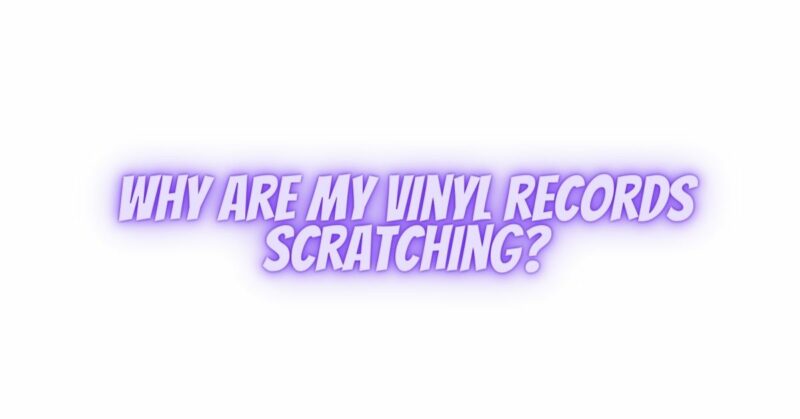Vinyl records are beloved for their warm analog sound and tactile appeal, but they are also susceptible to damage, including scratches. Scratches can negatively impact sound quality and detract from the listening experience. In this comprehensive guide, we’ll explore the common causes of vinyl records scratching, how to prevent scratches, and what to do if your records become scratched.
Understanding Vinyl Record Structure
To understand why vinyl records can scratch, it’s essential to know their structure. Vinyl records consist of a thin plastic disc with grooves containing audio information. A stylus (needle) in your turntable’s tonearm follows these grooves to reproduce music. The stylus’s delicate tip must maintain continuous contact with the groove walls to track the audio accurately. Any interruption in this contact, such as a scratch, can lead to audio problems.
Common Causes of Vinyl Record Scratching
Several factors and actions can cause vinyl records to scratch:
- Dust and Debris: Dust, dirt, and debris on the record surface can be abrasive and cause scratches. When the stylus encounters these particles, it may drag them along the grooves, resulting in damage.
- Improper Handling: Mishandling records, such as touching the playing surface with fingers or placing them on rough surfaces, can transfer oils, dirt, and debris to the grooves, leading to scratches.
- Stylus Condition: A worn or damaged stylus can exacerbate scratching issues. A damaged stylus may not track the grooves accurately, increasing the likelihood of scratching.
- Alignment and Calibration: An improperly aligned or calibrated turntable tonearm can cause tracking errors, leading to scratches as the stylus struggles to follow the grooves.
- Environmental Factors: High levels of humidity or static electricity can affect how dust and debris adhere to records, potentially increasing the risk of scratches.
- Turntable Quality: Low-quality or poorly maintained turntables may have tracking issues, causing scratching problems.
- Playback Errors: Accidentally bumping or moving the turntable during playback can cause the stylus to skip or jump, potentially scratching the record.
Preventing Vinyl Record Scratching
Preventing scratches on your vinyl records is essential for maintaining their audio quality. Here are comprehensive tips to help you prevent scratches:
- Handle Records Carefully: Always handle records by the edges to minimize contact with the grooves. Avoid touching the playing surface with your fingers.
- Clean Records Before Playback: Use a carbon-fiber brush or antistatic brush to remove dust and debris from records before playing them. Clean records are less likely to transfer contaminants to the stylus.
- Keep Turntable Clean: Regularly clean your turntable’s platter and tonearm to prevent dust and debris from accumulating and transferring to records.
- Use a Quality Stylus: Ensure that your turntable’s stylus is in good condition and properly aligned. A well-maintained stylus is less likely to cause damage.
- Protective Sleeves: Store records in protective inner sleeves to prevent scratches from dust and debris. Outer sleeves can also protect records from physical damage.
- Store Vertically: Store records vertically to prevent warping and minimize the risk of scratches from stacking.
- Avoid Poor-Quality Record Players: Cheap or poorly designed turntables can contribute to stylus wear and scratching. Invest in a quality turntable.
What to Do if Your Records Are Scratched
If your vinyl records become scratched, you can take the following steps:
- Inspect the Damage: Examine the record under a good light source to assess the severity of the scratches.
- Use a Cleaning Solution: Some mild scratches can be minimized with a vinyl record cleaning solution and a soft brush. Gently clean the record in a circular motion. Rinse and dry the record thoroughly.
- Consider Professional Cleaning: For valuable or severely scratched records, consider professional cleaning and restoration services.
- Replace the Stylus: If the stylus is damaged due to scratched records, consider replacing it to prevent further damage to your records.
- Digitize Scratched Records: If a scratched record is still playable, consider digitizing it to preserve the music digitally.
Conclusion
Scratches on vinyl records can negatively impact sound quality and the overall listening experience. By following proper handling practices, maintaining your turntable and stylus, and keeping records clean, you can minimize the risk of scratches. In the event that your records become scratched, prompt action can help minimize the damage and preserve the music. Proper care and maintenance will ensure that your vinyl collection remains in excellent condition for years to come.

